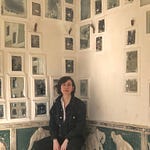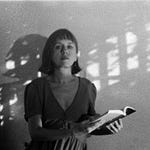In Eva Tuschman Leonard’s forthcoming artist’s book Bodywork (Bored Wolves and Firehouse Press co-edition, April), a collection of drawings, prose (from which Eva reads an extract above), and textual fragments, the writer, visual artist, and psychotherapist situates herself in two times and two states of being two decades apart: as a physically expressive and active human body in its twenties; and as one later subjected to the debilitations of autoimmune disease and requiring the daily labor—the titular Bodywork—of pain management.
And yet a linear timeline cat’s-cradles itself when Eva rediscovers a cache of works on paper—self-portraits—in a forgotten personal archive. Of the period of their creation, the artist recollects:
“Flashback to my late teens and twenties when the life force pulsing through me was constantly searching for meaning. My inner landscape overflowed with dreams, longing, and a hunger to find my place in the world. Art-making became a dialogue, a dynamic conversation between interiority and exteriority.”
Regarding the drawings from the latter-day vantage of mornings woken to “feeling as if I had been steamrolled, my limbs filled with lead, the nerves on the left side of my brain and body radiating pain,” Eva is unexpectedly struck by the uncanny prescience of these self-portraits from the past, with their suggestion of contorted corporeality:
“Bodies stripped of their contours, bodies unraveling, bodies dismembered, obscured, and partially erased. When I rediscovered these works on paper, created decades earlier, in their abandoned archive, I was astonished by how they made visible the invisible experience of illness in the body. They struck me as eerily prophetic, the mark-making articulating the disorientation of my malfunctioning body as if foreseeing it, anticipating the affliction to come.”
Then, once more, the narratives of decades initially defined by lack of, or subjection to, pain, helix:
“At the same time, a passion permeates the drawings, a life force that I can still remember on a visceral level coursing through the young woman who created them. In this way, Bodywork is not just about illness—it is also about ecstasy.
“How is it that so much pain and so much pleasure can be experienced in one body?”










